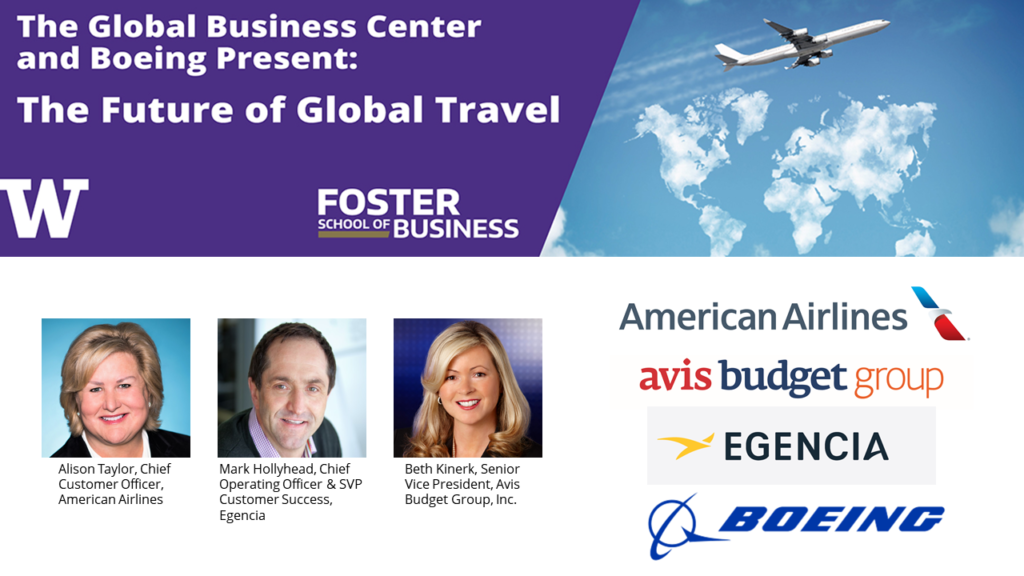The Future of Global Travel
 On February 4, guests joined a webinar sponsored by Boeing and the Global Business Center with one question on their minds: what’s ahead for global travel? Mark Hollyhead, Chief Operating Officer and Senior Vice President of Customer Success at Egencia (an Expedia Group Company), facilitated a dynamic conversation with Alison Taylor, Chief Customer Officer at American Airlines, and Beth Kinerk, Senior Vice President of Avis Budget Group, Inc. The three experts shared insights on how their companies have responded with increased empathy to the changing needs of travelers as well as their forecasts for the industry.
On February 4, guests joined a webinar sponsored by Boeing and the Global Business Center with one question on their minds: what’s ahead for global travel? Mark Hollyhead, Chief Operating Officer and Senior Vice President of Customer Success at Egencia (an Expedia Group Company), facilitated a dynamic conversation with Alison Taylor, Chief Customer Officer at American Airlines, and Beth Kinerk, Senior Vice President of Avis Budget Group, Inc. The three experts shared insights on how their companies have responded with increased empathy to the changing needs of travelers as well as their forecasts for the industry.
The Priority of Safety
Safety takes the prize as definitive priority in travel. Even with narrow margins, American Airlines, Avis Budget Group, and Egencia have continued to focus on customer experience over dollars because as Beth Kinerk shared, there is “no competition when it comes to safety and security”. In the past year, Avis Budget Group has invested in campaigns to understand what makes drivers feel assured behind the wheel. American Airlines studied how things like cabin lighting, food and beverages, and air filters impact passenger confidence. Both companies also hired epidemiologists to advise their business protocols and programs.
Trends in Travel
The pandemic forced travelers and the travel industry to adapt and innovate. This has resulted in a change in the landscape of destinations. Rather than the usual tourist hot spots, the industry has seen an appetite for newness with shifts toward nearer-to-home but still unexplored destinations. They’ve also seen growth in the popularity of vacation rentals and accommodations like VRBO that offer personalized experiences with contact-less check-in and check-out.
The traveler has also changed. Alison shared that the average age of airline travelers dropped from the mid-40s to 27, likely due to reduced corporate travel. To meet the spike in young leisure travel which grew mostly from secondary and tertiary cities, American Airlines has adapted their marketing strategy, making investments outside typical travel hubs. The swing toward younger travelers is true across the industry. Avis Budget Group has seen younger car renters and a pivot toward longer leases primarily for leisure rather than commercial purposes.
As travelers prioritize safety, it’s no surprise that how they travel has changed. Consumers have elected to hire intermediaries to help them deal with itinerary changes and provide crisis support, growing business for agencies and third-party providers. Companies are also taking the time to rethink travel all together, examining the need for in-person versus virtual engagements. Mark’s team at Egencia has been asked to serve as de facto consultants to help clients manage corporate travel policies with a values-based approach.
While corporate travel took a plunge in 2020, the industry found new growth opportunities. Airline cargo services were more lucrative than any year prior to the pandemic with increased demand from delivery services like FedEx, UPS, and Amazon. Budget Truck and Zipcar also had a booming year, and Avis Budget Group found an opportunity in an unexpected industry – lawn and garden. They noticed households building pools in their gardens and cultivated a new customer base with unique transportation needs.
Innovations in Travel
Acknowledging travelers will remain cautious in 2021, Alison expects the demand for self-service to increase. For example, investments in biometric technology have moved airports toward completely touchless experiences. The “health wallet” is another tool built to put control back in the hands of travelers. These wallets are applications that include comprehensive information about where to get COVID-19 tests upon landing and what documents are needed to enter a country. Early results from travelers using health wallets have been positive.
Forecast
The outlook for travel is bright, but it may take time to recover. The industry is prepared for 2021 and 2022 to be transitional years. The anticipated initial phase will be a return to “meaningful travel” with people taking flights and cars to visit friends and family who they’ve been separated from due to the pandemic. After that will come a return to business travel. They expect corporations will continue to reassess their travel policies and define the circumstances that require physical engagements. While internal meetings will continue online for a while, the fatigue of e-meetings could encourage a return to in-person meetings with external clients, even if this trend doesn’t kick in immediately.
Once out of the transition phase, the travel industry expects pre-pandemic demand and potentially even more activity due to the new market opportunities uncovered in this season of innovation. They anticipate a continued reliance on agencies. Vacation rentals will likely remain a popular accommodation choice. They also expect more questions about sustainability.
The speakers all look forward to increased partnership ahead within the industry, working together to help people get around the world. Companies like American Airlines, Avis Budget Group, and Egencia became particularly close in 2020 over a shared sense of unity and purpose. Their continued partnership will likely transition into designing new models that make travel even more seamless, door-to-door, for consumers. With this, we can expect substantial enhancements for travelers in the coming years.
The Global Business Center would like to thank Boeing, Egencia, Avis Budget Group, and American Airlines for their partnership on this event!
